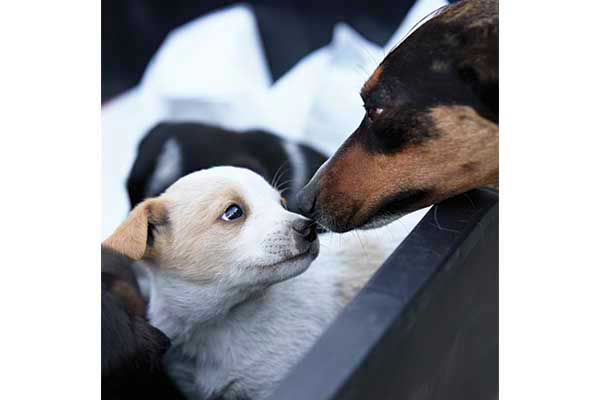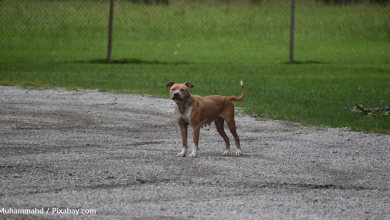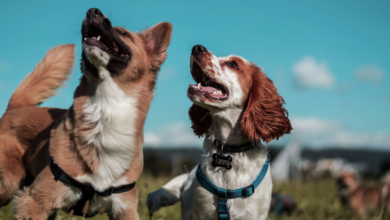Refugee dogs in Ukraine | Ukrainian animals

It’s been a month since the war started. I am in Ukraine, joined by a Polish veterinary group from Ada . Foundation – an animal clinic and hospital located near the Ukrainian border in Poland. We are traveling in a convoy of two animal ambulances, loaded with much-needed food and medical supplies, with a mission to help pets displaced by war.
We passed a military checkpoint as we drove back to the small village of Mo´sciska, located on the outskirts of Lviv. There’s a strange sense of foreboding when war breaks out, just 350 miles away.

Overwhelming shelters in Ukraine
“The shelters in Ukraine are overcrowded because all the dogs come from the east,” said Cezar Kotowicz, trip coordinator, referring to dogs from the war-torn areas. “These shelters don’t have enough resources and need our help.”

We went to Hope Farm, a small shelter run by Anya Zhuk. Friendly tail wags and barks greeted us as we began unloading the 3 tons of donated kibbles and other supplies. “We have 80 rescues here,” said Anya. “Three more came this morning.”
The team unpacked and assembled the metal crates while the seven dogs entwined to evacuate. “One broke his leg,” Anya told me. “Some have lost their owners and need affection. We can’t hug them all.”
One by one, the dogs are carefully loaded into a truck with a soft bed and blanket for a long safe ride and a new life.
At the Asylum of Mercy shelter, we help Nataliya Kuznetsova, who has almost 300 dogs. “We need a lot of food to care for these dogs,” says Nataliya, who started the nonprofit in 2006. “It’s a difficult situation.”
Pets are innocent bystanders
The Ada Foundation is committed to supporting these and other shelters in times of need. In order to bring back rescued dogs from Ukraine, Polish border control requires that each dog be microchipped and have all the required vaccine paperwork.

“We have treated over 400 dogs from Ukraine,” says Radak Fedaczynski, veterinarian and co-owner of the Ada Foundation. He introduced me to Moon, a German Shepherd rescued from Ukraine. “She is an older dog,” he said.
Moon came to the center with dehydration and a severe skin infection. Dr. Fedaczynski then pointed to a small mass under her abdomen. “She has a tumor that needs to be removed.”
In another room, there are more war stories. There, I met Hart, a healthy, 1-year-old black Husky with blue eyes. He had to have a cast on each of his front legs, both of his front legs were badly broken.
Next, I met Vira, a small dog recovering from gunshot wounds and spinal cord injuries. Veterinarian Jakub Kotowicz of the Ada Foundation said: “She was saved from the war-torn Donbas region. With her hind legs suspended in an upright harness, Vira received water therapy. Dr. Kotowicz showed me her CT scan showing a small bullet lodged in the middle of her spine. “She may not be able to use her hind legs in the future, so we are preparing to build her a wheelchair.”
Vira wagged her tail as they encouraged her to move her hind legs in the warm water. “Rehabilitation is a long process,” says Dr. Kotowicz. “But at some point, she will be able to be adopted.”
Like children, these dogs are innocent war witnesses. People who do not swim in the sea. But there is something very different about this conflict as it concerns animals. The world’s coverage in the media and social media has brought Ukraine’s pets to the forefront, day in and day out. And in doing so, their stories will not be anonymous.

How can you help Ukraine’s pets
We are here at Dogster love animals, and it is heartbreaking to see all the beloved pets that have been displaced or are struggling with their people in Ukraine as they try to flee to safety.
Many larger national and international animal organizations have stepped up to help animals in Ukraine. Here are just a few:
American Society for the Prevention of Cruelty to Animals (ASPCA) donated $150,000 in emergency funds to international animal welfare efforts to meet the urgent needs of animals and pet owners affected by war.
The International Fund for Animal Welfare (IFAW) is working with local partners to source supplies for wildlife sanctuaries and animal shelters in Ukraine.
Humane America authorized a $10,000 emergency grant to help with IFAW’s efforts.
Charity of the American Veterinary Medical Association (AVMA), American Veterinary Health Organization (AVMF) directed a donation of $100,000 from Merck Animal Health to support veterinary and animal welfare groups in Ukraine and surrounding areas, then combined it with their own $100,000 grant.
But it’s not just organizations. Many US veterinarians have come to Ukraine to offer their help. These are stories from three of them. You can track their travels and find organizations they recommend to support.
Dr. Marty Beckerfounder of Fear Free Pets, covered his own expenses and went to the Ukraine-Romania border, where he worked closely with Romanian rescue forces Sava’s Safe Haven, and help with pet care in a tent with veterinary services, using the fearless techniques he’s created. Learn more at drmartybecker.com.
Colorado-based veterinarian Dr. Jon Geller went to a Romanian border crossing with Ukraine, where he was able to set up a government approved and licensed veterinary clinic in a large tent provided at the border post, mainly taking care of animals. asylum to allow them to continue through Europe. Dr. Geller added the Project Ukraine initiative to his existing nonprofit Street Dog Alliance, which provides free veterinary services to the pets of people experiencing homelessness. Learn more at thestreetdogcoalition.org.
Dr. Gary Weitzmanveterinarian and president of San Diego Humane Society, collect medical supplies, and spend 10 days in a pop-up clinic on the Polish-Ukrainian border with the goal of taking care of as many animals as possible in that time. Working with a group of German volunteers, they provided food, supplies and first aid to the animals. Find out more about his travels by doing a search for “Ukraine” at sdhumane.org.
It is not possible to list all the individuals and organizations that are helping the people and pets of Ukraine. We ask our readers to tell us about anything they’ve come across and we’ll add them to the list dogster.com. Just Email us at the address [email protected].
Alan De Herrera is a national and international travel photojournalist who specializes in humane, wildlife and canine stories. He lives in Irvine, California, with his Border Collie mix, Capitán. Follow him on instagram @ alandeherrera.ig.




